 “Prepare very nice foodstuffs of all descriptions from the grains and ghee collected for the yajna. Prepare rice, dahl, then halavah, pakora, puri and all kinds of milk preparations like sweet rice, sweetballs, sandesha, rasagulla and laddu and invite the learned brahmanas who can chant the Vedic hymns and offer oblations to the fire. The brahmanas should be given all kinds of grains in charity. Then decorate all the cows and feed them well.” (Krishna giving direction on the first Govardhana Puja, Krishna, The Supreme Personality of Godhead, Vol 1, Ch 24)
“Prepare very nice foodstuffs of all descriptions from the grains and ghee collected for the yajna. Prepare rice, dahl, then halavah, pakora, puri and all kinds of milk preparations like sweet rice, sweetballs, sandesha, rasagulla and laddu and invite the learned brahmanas who can chant the Vedic hymns and offer oblations to the fire. The brahmanas should be given all kinds of grains in charity. Then decorate all the cows and feed them well.” (Krishna giving direction on the first Govardhana Puja, Krishna, The Supreme Personality of Godhead, Vol 1, Ch 24)
Download this episode (right click and save)
One side bemoans the current situation. They remember what it was like before, and so they can accurately compare the two:
“It doesn’t matter where you go today, everyone is on their phone. It is like they are zombies or something. They can’t go a minute without checking, without swiping left and right and scrolling up and down. What is becoming of our society? Who will actually be mature enough to lead, to put priorities in their proper order? I remember in times past there weren’t these issues. You could sit down with someone and have a conversation. You had to develop social skills in order to survive. It seems nowadays people are rewarded for being antisocial, which is nothing more than having a lack of etiquette.”
The other side sees nothing wrong with the situation. They think technology has made life so much better:
“I was at a funeral recently for an important public personality. So many well-known people were in attendance, and you know what? Everyone was on their mobile phones. Some had to step out every now and then to take calls. This is the reality of the present day. I love that I can get notified of incoming calls and texts through my watch. I don’t have to reach into my pocket for the phone. I am always connected to the world. I can communicate with people thousands of miles away.”
 From the simple life exhibited in the place known as Gokula described in Vedic literature, we see that basic commerce can still take place with ample time leftover for higher pursuits.
From the simple life exhibited in the place known as Gokula described in Vedic literature, we see that basic commerce can still take place with ample time leftover for higher pursuits.
1. The protection of cows
This was a special place, in particular because of the appearance of Shri Krishna, the Supreme Personality of Godhead. Though He is everywhere simultaneously through His feature of Paramatma, He only directly manifests in the personal form on rare occasions.
When He does appear, He favors the devotees in terms of association. Gokula is a farm community neighboring the city of Mathura. Krishna arrives there through the help of Vasudeva, the birth-father. Krishna spends the childhood years under the care of Nanda Maharaja and mother Yashoda.
Nanda has so many cows under his protection. This is not a dogmatic preference. This is not a random association. The cows have spiritual significance that cannot be explained through logic alone. While stool is generally considered unclean and inauspicious, with cows the same substance has tremendous value, as does urine.
Aside from the spiritual benefits that accrue, the cow helps to solve the basic economic problem. If you have nothing else to your name, a single cow with some land on which to feed can produce an abundance of milk.
2. The trade of milk and milk products
The excess can be shared with others, sold, or traded for other commodities. The people in Vrindavana had so much milk and cream that they would go to other towns to sell. Everyone was happily engaged in some kind of work. Though not officially employed in a large, multinational firm, everyone had something to do; there wasn’t idleness.
They were happily engaged since they had Shri Krishna with them. The work was a matter of fact aspect of life. The responsibilities were important, but Yashoda’s son was the person occupying their thoughts. Remembering Him can turn any experience blissful.
3. The growing of food
The cows were protected, the trees provided ample fruit, and there was a sufficient amount of grain. What more could anyone want? Evidence of the abundance of supply is documented in the accounts of the first Govardhana Puja.
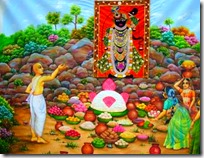 Gokula-Vrindavana is indeed God’s country. During Krishna’s manifest lila, the people did not require any outside distractions. The simple life was enough to satisfy them. They had ample time to enjoy with song, dance, and food consumed with a purified consciousness.
Gokula-Vrindavana is indeed God’s country. During Krishna’s manifest lila, the people did not require any outside distractions. The simple life was enough to satisfy them. They had ample time to enjoy with song, dance, and food consumed with a purified consciousness.
While it may be difficult to replicate the environment in the hectic modern day, the connection with God in the all-attractive form is still possible. A person can immediately be transported to Gokula through hearing Shrimad Bhagavatam and other related Vedic texts. They can connect with Krishna today through the chanting of His names: Hare Krishna Hare Krishna, Krishna Krishna, Hare Hare, Hare Rama Hare Rama, Rama Rama, Hare Hare.
In Closing:
Bemoaning the current plight,
Zombie society drawn by light.
On device carried small,
For email or person to call.
From Gokula a different pace,
But commerce still taking place.
Daily needs accounted for them,
More time with Krishna then.

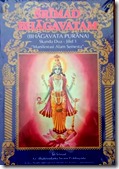 “In the Shrimad-Bhagavatam it is said that anyone who hears the story of the Syamantaka jewel or describes it or simply remembers it will be free from all kinds of defamation and the reactions of all impious activities and thus will attain the highest perfectional condition of peace.” (Krishna, The Supreme Personality of Godhead, Vol 2, Ch 2)
“In the Shrimad-Bhagavatam it is said that anyone who hears the story of the Syamantaka jewel or describes it or simply remembers it will be free from all kinds of defamation and the reactions of all impious activities and thus will attain the highest perfectional condition of peace.” (Krishna, The Supreme Personality of Godhead, Vol 2, Ch 2)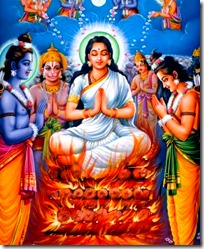 Friend1: Come on! Those are material rewards. Who cares if I am free from defamation? Shri Krishna was accused of stealing a silly jewel that produced gold. Sita Devi, the wife of the Supreme Lord, had false rumors spread about her time in Lanka against her will. If those two can’t get a fair shake, who am I to expect one?
Friend1: Come on! Those are material rewards. Who cares if I am free from defamation? Shri Krishna was accused of stealing a silly jewel that produced gold. Sita Devi, the wife of the Supreme Lord, had false rumors spread about her time in Lanka against her will. If those two can’t get a fair shake, who am I to expect one?  Friend2: Absolutely. Maharaja Parikshit sat for seven days and did nothing but hear. We would love to do the same, but who actually can follow through? These rewards make you feel good, hopefully. You will develop a further attachment to Krishna-katha, which as a standalone can provide
Friend2: Absolutely. Maharaja Parikshit sat for seven days and did nothing but hear. We would love to do the same, but who actually can follow through? These rewards make you feel good, hopefully. You will develop a further attachment to Krishna-katha, which as a standalone can provide 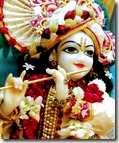 “One who is thus transcendentally situated at once realizes the Supreme Brahman. He never laments nor desires to have anything; he is equally disposed to every living entity. In that state he attains pure devotional service unto Me.” (Lord Krishna, Bhagavad-gita, 18.54)
“One who is thus transcendentally situated at once realizes the Supreme Brahman. He never laments nor desires to have anything; he is equally disposed to every living entity. In that state he attains pure devotional service unto Me.” (Lord Krishna, Bhagavad-gita, 18.54) Friend2: As in the parents reminding you to study for an upcoming exam?
Friend2: As in the parents reminding you to study for an upcoming exam? 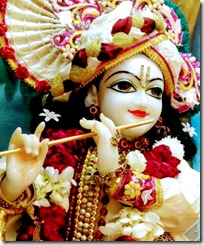 Friend2: Because they aren’t really tragedies. The individual, who is spirit soul, undergoes some temporary suffering in a destructible body. The experience is something like a dream. Self-realization is waking up. It is seeing everything properly. The devotees have a greater appreciation for the Supreme Lord through the amazing ability of the illusory energy of maya to fool otherwise intelligent beings. Hiranyakashipu reached the point of thinking he could rule over the world forever, using just brute force. A person can only be so foolish if there is a corresponding energy engaging them. Saintly people appreciate Krishna for being able to create such an energy. They are neither saddened nor pessimistic about the situation in the manifest world. They know who is coordinating everything behind the scenes.
Friend2: Because they aren’t really tragedies. The individual, who is spirit soul, undergoes some temporary suffering in a destructible body. The experience is something like a dream. Self-realization is waking up. It is seeing everything properly. The devotees have a greater appreciation for the Supreme Lord through the amazing ability of the illusory energy of maya to fool otherwise intelligent beings. Hiranyakashipu reached the point of thinking he could rule over the world forever, using just brute force. A person can only be so foolish if there is a corresponding energy engaging them. Saintly people appreciate Krishna for being able to create such an energy. They are neither saddened nor pessimistic about the situation in the manifest world. They know who is coordinating everything behind the scenes. 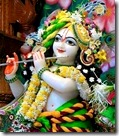 “Always chanting My glories, endeavoring with great determination, bowing down before Me, these great souls perpetually worship Me with devotion.” (Lord Krishna, Bhagavad-gita, 9.14)
“Always chanting My glories, endeavoring with great determination, bowing down before Me, these great souls perpetually worship Me with devotion.” (Lord Krishna, Bhagavad-gita, 9.14)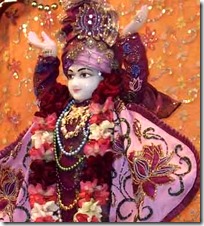 As the Supreme Personality of Godhead is timeless, so are various activities associated with devotion to Him, as popularized by Shri Krishna Chaitanya Mahaprabhu. These may appear to be modern inventions, ways to appeal to the masses, but the tendency is part of the very soul, which is the essence of living.
As the Supreme Personality of Godhead is timeless, so are various activities associated with devotion to Him, as popularized by Shri Krishna Chaitanya Mahaprabhu. These may appear to be modern inventions, ways to appeal to the masses, but the tendency is part of the very soul, which is the essence of living. 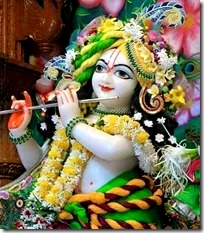 The formula is simple, so why not give it a try? What does a person really have to lose? There is a strong philosophical foundation; not that the practices are due to blind sentiment. Bring every doubt to the table, become renounced through enjoying. The paradox begins to resolve the more one associates with Krishna and those devoted to Him.
The formula is simple, so why not give it a try? What does a person really have to lose? There is a strong philosophical foundation; not that the practices are due to blind sentiment. Bring every doubt to the table, become renounced through enjoying. The paradox begins to resolve the more one associates with Krishna and those devoted to Him.  “Even if you are considered to be the most sinful of all sinners, when you are situated in the boat of transcendental knowledge, you will be able to cross over the ocean of miseries.” (Lord Krishna, Bhagavad-gita, 4.36)
“Even if you are considered to be the most sinful of all sinners, when you are situated in the boat of transcendental knowledge, you will be able to cross over the ocean of miseries.” (Lord Krishna, Bhagavad-gita, 4.36)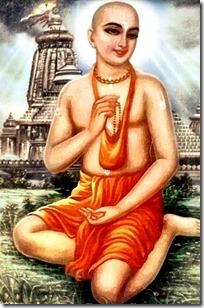 Friend1: Okay, but someone who wants to get really serious, wherein they formally accept a teacher and the like, has to agree to four basic principles. No meat eating. No gambling. No intoxication, and no illicit sex.
Friend1: Okay, but someone who wants to get really serious, wherein they formally accept a teacher and the like, has to agree to four basic principles. No meat eating. No gambling. No intoxication, and no illicit sex.  Friend2: You have to judge for yourself. Shri Krishna explains in the
Friend2: You have to judge for yourself. Shri Krishna explains in the 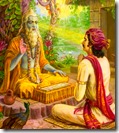 “Originally there was only one Veda, and there was no necessity of reading it. People were so intelligent and had such sharp memories that by once hearing from the lips of the spiritual master they would understand. They would immediately grasp the whole purport. But 5,000 years ago Vyasadeva put the Vedas in writing for the people in this age, Kali-yuga. He knew that eventually the people would be short-lived, their memories would be very poor and their intelligence would not be very sharp.” (Shrila Prabhupada, Shri Ishopanishad, Introduction)
“Originally there was only one Veda, and there was no necessity of reading it. People were so intelligent and had such sharp memories that by once hearing from the lips of the spiritual master they would understand. They would immediately grasp the whole purport. But 5,000 years ago Vyasadeva put the Vedas in writing for the people in this age, Kali-yuga. He knew that eventually the people would be short-lived, their memories would be very poor and their intelligence would not be very sharp.” (Shrila Prabhupada, Shri Ishopanishad, Introduction) Within the RDBMS there are certain strategies to help find data. Nothing is perfect, and every layer adds further complexity to the import process, but at least there is some way to ask questions and get answers fast.
Within the RDBMS there are certain strategies to help find data. Nothing is perfect, and every layer adds further complexity to the import process, but at least there is some way to ask questions and get answers fast.  The present age of Kali negatively influences memory power. Man can’t remember as well as they used to. Proof is there in analyzing only a short duration of time, such as fifty years. Without computers and calculators, students were taught to remember much more important information. Now there is seemingly no need, since anything can be looked up in a matter of seconds on a smartphone device.
The present age of Kali negatively influences memory power. Man can’t remember as well as they used to. Proof is there in analyzing only a short duration of time, such as fifty years. Without computers and calculators, students were taught to remember much more important information. Now there is seemingly no need, since anything can be looked up in a matter of seconds on a smartphone device. 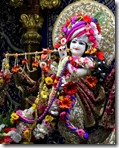 “Of all creations I am the beginning and the end and also the middle, O Arjuna. Of all sciences I am the spiritual science of the Self, and among logicians I am the conclusive truth.” (Lord Krishna, Bhagavad-gita, 10.32)
“Of all creations I am the beginning and the end and also the middle, O Arjuna. Of all sciences I am the spiritual science of the Self, and among logicians I am the conclusive truth.” (Lord Krishna, Bhagavad-gita, 10.32) The issue here is that technology has changed significantly. A few video stores are still around, but the internet has changed the way the public consumes video programming. They no longer require physical storage. They can stream content directly from their television or tablet computer.
The issue here is that technology has changed significantly. A few video stores are still around, but the internet has changed the way the public consumes video programming. They no longer require physical storage. They can stream content directly from their television or tablet computer. 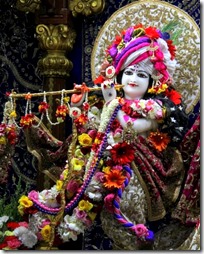 An ideal reference is Shri
An ideal reference is Shri